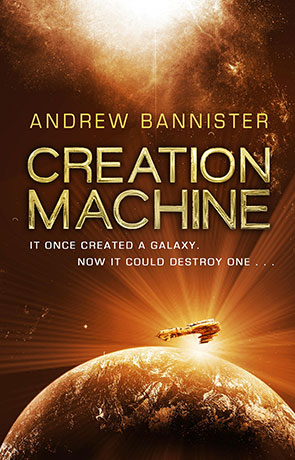
I read Creation Machine as an ebook after we had returned from our holiday in Norwich, having looked through a copy in Waterstones. Sorry, Waterstones, but I did buy Cold Welcome1 on the same visit, so I wasn’t completely parasiting on your hospitality. One of the reviews called Andrew Bannister a worthy successor to Iain M. Banks, and I think there is something to that: Bannister writes with an attentive detail that focuses upon wonderful settings and societies whose values almost-but-not-quite echo real historical eras. He has the gift Banks had of creating the shimmer and weight of the worlds in which his characters scheme and grapple, and he is a competent master of plotting: the book unfolds on several timetracks and it is not clear until the end which will be the base setting for the trilogy. I was surprised and somewhat grieved by his choice of which lead character died in the climax; which thread came to a close. It was an absorbing, atmospheric read.
The background of the novel is a galaxy that is the manufactured product of a vast, dead civilization, now divided into zones of influence that are fluid and in tension. A coup within the largest, led by the hero’s evil industrialist father, has crushed the rebellion of which she was a part and he is now leading an expansive war of aggression against its unsavoury neighbours. Fleare, the hero, is enhanced, and her sidekick-cum-spirit guide is a dead former comrade and lover who has been revived as semi-material computer code. They gather various other allies on a quest to discover an artefact of the makers; the species who created the galaxy. That artefact is sentient, and becomes a deus ex machina in the book’s climax.
As the story progresses, Fleare is forced to interact with an agent within a multi-layered virtual universe, in which I thought I detected references to the real Earth, though I may have misread that. I felt that the cyber elements of the plot dragged a bit, and was worried, for a while, that the author had lost his way, although he brought it back to a successful and emotionally coherent conclusion with great control.
Bannister’s love of SF is evident in his writing. In summary, the book sounds like a collection of cliches, but it is not actually so. As I read it, I was happily absorbed, and had that satisfying sense of not wanting it to end that really well-envisioned novels build. It is, I think, a success.
Strangely, though, less than a month on from finishing it, I could hardly remember it, and had to reopen it on my Tolino to remind myself of its plot and structure. Like a few of Banks’ Culture novels, it is an experience without an aftertaste, hinting at great depth and moment, but failing to entirely find its own pulse or purpose. The second book, Iron Gods, like Banks’ Culture series, is set in the same universe as the first, but in a different era, with, I assume, a different cast. That may not be a bad thing: Banks managed to create something vast and beautiful from such an approach, and the links of familiarity often gave me shocks of excitement, as in the dawning realization of Vosill’s true identity in Inversions.2Since this is a first novel, I hope that, as Banks did, Bannister will find his focus. I will be reading the next instalment, but I am not in such a rush that I will buy it before it drops a bit in price.
Leave a Reply
You must be logged in to post a comment.